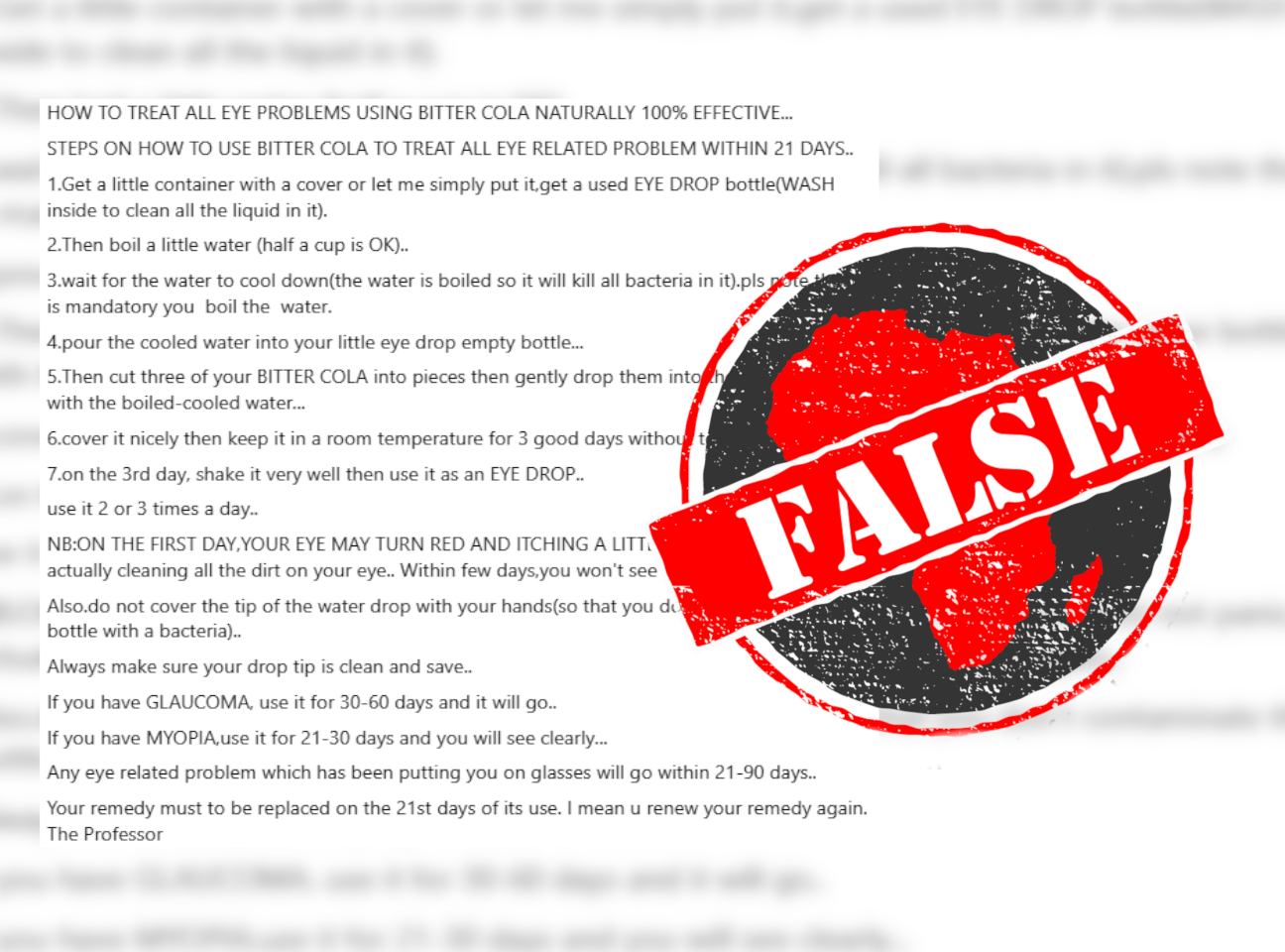IN SHORT: Our eyes are sensitive and easily damaged, which could lead to blindness. Don’t put anything in your eyes that hasn’t been approved by a qualified health professional.
A Facebook post with some 114,000 shares and 23,000 likes gives dangerous advice about treating eye problems.
It claims that they can be naturally treated with a mixture of water and bitter cola (kola).
Bitter kola is a flowering plant found in Central and West Africa.
The claim sets out seven steps to prepare the mixture:
- Get a used, but clean, eye drop bottle
- Boil a little water, the claim says about half a cup
- Wait for the water to cool down
- Pour the cooled water into the empty eye drop bottle
- Cut three bitter kola plants into pieces then “gently drop them into the same bottle with the boiled-cooled water”
- Cover it and keep in “room temperature for 3 good days without touching it”
- Lastly, “on the 3rd day, shake it very well then use it as an eye drop”
It says to use the mixture two to three times a day. It then provides a disclaimer that the eye may itch and turn red on the first day. “You must not panic, it is actually cleaning all the dirt on your eye.”
The claim has been doing the rounds on the social media platform in South Africa and Nigeria.
It also says the mixture can cure glaucoma and myopia. But it’s no cure – and could cause real harm.

‘Never put anything in your eye that isn’t made to go in your eye’
The UK's National Health Service (NHS) explains that glaucoma is a condition where the eye’s optic nerve is damaged. The optic nerve sends messages to the brain, allowing you to see.
The damage is normally caused by a buildup of fluid, increasing pressure inside the eye, says the NHS.
If the condition is not diagnosed early and treated properly, it could lead to loss of vision.
The NHS says routine eye tests may help early diagnosis of glaucoma. The symptoms develop slowly over many years and could be overlooked.
Treatment options for glaucoma include eye drops and surgery, says the Glaucoma Research Foundation, a national nonprofit in the US.
We could find no evidence that bitter kola is used to treat glaucoma.
Bitter kola can’t stop nearsightedness
The other condition mentioned in the Facebook post is myopia or nearsightedness, in which near objects are clear and further objects are blurry.
According to the nonprofit Mayo Clinic in the US, myopia occurs when the shape of the eye causes light to enter and bend incorrectly.
Symptoms include headache, eye strain and blurry vision. Treatment includes prescription lenses or surgery, says the Mayo Clinic.
Again, no mention of bitter kola.
So what are the more common eye drops people can use to treat eye problems? There are a range of eye drops used every day, says the American Academy of Ophthalmology.
It lists a few: dilating drops for eye exams, redness-relieving drops, lubricant drops for dry eyes, anti-allergy drops for itchy eyes and numbing drops for eye surgery.
But in the words of the American Academy of Ophthalmology: “Never put anything in your eye that isn’t made to go in your eye.”
Rather seek expert medical attention
Dr Alison Taylor, an ophthalmologist at the Wits Donald Gordon Medical Centre in South Africa, told Africa Check that she had never heard of using the bitter kola plant in eye preparations.
“It’s always best for people to seek expert medical attention for eye problems,” she said.
Republish our content for free
For publishers: what to do if your post is rated false
A fact-checker has rated your Facebook or Instagram post as “false”, “altered”, “partly false” or “missing context”. This could have serious consequences. What do you do?
Click on our guide for the steps you should follow.
Publishers guideAfrica Check teams up with Facebook
Africa Check is a partner in Meta's third-party fact-checking programme to help stop the spread of false information on social media.
The content we rate as “false” will be downgraded on Facebook and Instagram. This means fewer people will see it.
You can also help identify false information on Facebook. This guide explains how.


Add new comment